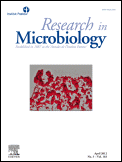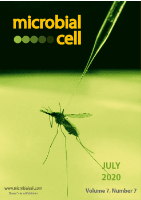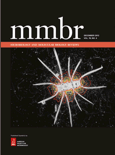
Microbiology Spectrum
Scope & Guideline
Empowering discoveries in microbiology and beyond.
Introduction
Aims and Scopes
- Microbial Pathogenesis and Host Interactions:
Research exploring the mechanisms by which microorganisms cause disease, including the identification of virulence factors and the interaction between pathogens and host immune responses. - Antimicrobial Resistance and Drug Development:
Papers addressing the emergence of antimicrobial resistance in various pathogens, including studies on resistance mechanisms, epidemiological trends, and the development of new antimicrobial agents. - Microbiome Research:
Investigations into the composition and function of microbial communities in various environments, including human health, agriculture, and ecology, with a focus on their roles in disease prevention and health promotion. - Environmental Microbiology:
Studies on microbial ecology, biogeochemical cycles, and the impact of environmental factors on microbial communities in natural and engineered systems. - Biotechnology and Synthetic Biology:
Research focused on the application of microbial systems in biotechnology, including metabolic engineering, bioremediation, and the development of microbial-based products. - Viral Pathogenesis and Vaccine Development:
Research on viral infections, including the mechanisms of viral pathogenesis, host-virus interactions, and the development of vaccines and antiviral therapies. - Microbial Genetics and Genomics:
Studies that utilize genomic and transcriptomic approaches to understand microbial evolution, diversity, and the genetic basis of phenotypic traits. - Clinical Microbiology and Diagnostics:
Research aimed at improving diagnostic methods for infectious diseases, including molecular techniques and their application in clinical settings.
Trending and Emerging
- Microbiome-Gut-Brain Axis:
An emerging area of interest focusing on how gut microbiota influence neurological health, mental health disorders, and their potential therapeutic roles. - Phage Therapy and Phage-Antibiotic Synergies:
Growing interest in bacteriophages as alternatives to antibiotics, including studies on their applications in treating antibiotic-resistant infections and enhancing the efficacy of existing antibiotics. - Metagenomics and Metatranscriptomics:
Advancements in sequencing technologies have led to an increase in studies utilizing metagenomic and metatranscriptomic approaches to explore complex microbial communities and their functional potentials. - Vaccine Development and Immunogenicity Studies:
Heightened focus on vaccine research, particularly in response to emerging infectious diseases, including COVID-19, with an emphasis on understanding immune responses and developing novel vaccine strategies. - Antibiotic Resistance Genomics:
The rise of genomic epidemiology to track and understand the spread of antibiotic resistance genes in various pathogens, highlighting the importance of genomic data in public health. - Environmental Microbiology and Climate Change:
Research exploring how climate change affects microbial communities and their roles in biogeochemical cycles, emphasizing the ecological implications of microbial responses to environmental stressors. - Synthetic Biology Applications in Microbial Research:
Increased interest in using synthetic biology approaches for engineering microbes to produce valuable compounds, improve bioremediation processes, and enhance agricultural productivity.
Declining or Waning
- Traditional Antibiotic Susceptibility Testing:
The focus on conventional methods for antibiotic susceptibility testing has decreased as rapid molecular diagnostics and novel antimicrobial approaches gain traction. - Studies on Non-Pathogenic Microbes:
Research exploring non-pathogenic microorganisms and their ecological roles has become less frequent, possibly overshadowed by the urgent need to address pathogenic species and antimicrobial resistance. - Environmental Microbial Diversity without Functional Context:
Papers that describe microbial diversity without linking it to functional implications or applications are less common, as the field shifts towards understanding the functional roles of microbial communities. - Use of Animal Models in Microbial Research:
The reliance on traditional animal models for studying microbial infections is declining as alternative methods, including in vitro systems and humanized models, become more popular.
Similar Journals

FEMS MICROBIOLOGY LETTERS
Exploring Microbial Innovations and InsightsFEMS Microbiology Letters, published by Oxford University Press, is a prestigious international journal dedicated to advancing the understanding of microbiology through concise and impactful research articles. With an ISSN of 0378-1097 and E-ISSN 1574-6968, this journal encompasses a wide range of topics within the fields of genetics, microbiology, and molecular biology, achieving a notable Q3 quartile ranking in these categories as of 2023. As an essential platform for researchers, professionals, and students, FEMS Microbiology Letters invites submissions that contribute valuable insights into microbial behaviors, genetic mechanisms, and innovative methodologies pivotal in the study of microbiology. Although it is not an open-access publication, the journal's rigorous editorial standards ensure high-quality content that is relevant and significant to its audience, furthering scholarly dialogue and collaboration in the vibrant field of microbiological research.

Malaysian Journal of Microbiology
Advancing Microbial Knowledge for a Healthier TomorrowMalaysian Journal of Microbiology is a prestigious open-access journal dedicated to advancing the field of microbiology, published by the Malaysian Society for Microbiology. Since its inception in 2005, this journal has become an essential platform for researchers and practitioners, facilitating the dissemination of innovative studies in applied microbiology, biotechnology, and infectious diseases. Based in Penang, Malaysia, this journal not only focuses on local microbiological research but also positions itself within the broader global scientific community. Although currently placed in the Q4 category in several relevant fields—including Applied Microbiology and Biotechnology, Infectious Diseases, and Medical Microbiology according to the 2023 Scopus rankings—it plays a crucial role in encouraging novel research and fostering collaboration among scientists. The journal encourages submissions that contribute to the understanding of microbial processes, disease mechanisms, and novel biotechnological applications, thereby supporting the continuous growth of knowledge in microbiology. With open access since its launch, the Malaysian Journal of Microbiology ensures that all published works are freely available to the public, enhancing their visibility and impact within the scientific community.

CANADIAN JOURNAL OF MICROBIOLOGY
Pioneering Discoveries in Applied MicrobiologyThe Canadian Journal of Microbiology, published by Canadian Science Publishing, is a well-respected journal established in 1954 that serves as a vital platform for advancing knowledge in the fields of microbiology and related disciplines. With an ISSN of 0008-4166 and an E-ISSN of 1480-3275, this journal is recognized for its rigorous peer-review process and its commitment to disseminating high-quality research that spans applied microbiology, biotechnology, genetics, immunology, and more. Currently indexed in several prestigious databases, its impact factor and category quartiles highlight its significance, ranking in the top tiers of applied microbiology and biotechnology as well as other intersecting fields. The journal provides an essential resource for researchers, professionals, and students seeking to stay informed on the latest advancements and breakthroughs, facilitating collaboration and innovation in the microbiological sciences. Set in the dynamic landscape of academia from its headquarters in Ottawa, Canada, the Canadian Journal of Microbiology remains steadfast in its mission to promote research that addresses key challenges and opportunities within the microbiological community.

Microorganisms
Advancing the frontiers of microbiological research.Microorganisms is a leading open-access journal published by MDPI based in Switzerland, catering specifically to the rapidly evolving fields of microbiology and virology. Since its inception in 2013, the journal aims to foster the dissemination of high-quality research through its comprehensive and interdisciplinary platform, with a particular focus on both fundamental and applied microbiological sciences. Contributing to its esteemed reputation, Microorganisms holds a commendable Q2 ranking in the categories of Microbiology and Virology, as well as in Medical Microbiology, highlighting its significance in the academic community. With a consistent impact, evidenced by its rankings in Scopus—such as rank #25 in Virology and #56 in Microbiology—the journal serves as an invaluable resource for researchers, professionals, and students looking to stay at the forefront of microbiological research. As an open-access journal, Microorganisms ensures that vital research findings are readily available to a global audience, promoting collaboration and innovation in the study of microbial life and its implications for health and disease.

RESEARCH IN MICROBIOLOGY
Connecting researchers with cutting-edge findings in microbiology.Research in Microbiology, published by Elsevier, is a prominent academic journal devoted to advancing the field of microbiology, encompassing a diverse array of topics including immunology, molecular biology, and biochemistry. Established in 1987, the journal has expanded its focus over the years, with a commendable impact factor reflecting its relevance and influence in the scientific community. Although it does not currently offer open access options, Research in Microbiology remains a crucial resource for researchers and professionals seeking to stay abreast of the latest findings and methodologies. The journal holds a respectable Q2 ranking in Medicine (miscellaneous) and a Q3 ranking in both Microbiology and Molecular Biology for 2023, highlighting its position within the scholarly landscape. With its base in France and accessible to a global audience, Research in Microbiology continues to foster scholarly exchange, making it an essential platform for the dissemination of impactful microbiological research.

mLife
Connecting researchers in the vibrant realm of microbial sciences.Welcome to mLife, an emerging journal at the forefront of microbiological research published by the esteemed WILEY in China. With its ISSN 2097-1699 and E-ISSN 2770-100X, mLife serves as a vital platform for scholars and practitioners aiming to advance their understanding of microbial sciences. With an impressive Q2 ranking in the Microbiology category and a Scopus rank of 143 out of 182, mLife is quickly establishing itself as a valuable source of cutting-edge research. The journal, covering a range of innovative topics from immunology to environmental microbiology, provides an engaging venue for disseminating high-quality research findings aimed at addressing real-world challenges. Authors and readers alike benefit from its accessibility features that encourage scholarly collaboration and information sharing. As we converge on the rich microbial landscapes from 2022 to 2024, mLife is committed to fostering a community dedicated to rigorous research and impactful discoveries.

Nature Microbiology
Pioneering Research for a Healthier TomorrowNature Microbiology is a premier journal published by NATURE PORTFOLIO that has firmly established itself within the realms of microbiological research since its inception in 2016. Based in the United Kingdom, this prestigious journal specializes in the intricacies of applied microbiology, cell biology, genetics, immunology, and medical microbiology, making it a cornerstone for academics and professionals alike. With an impressive Scopus ranking placing it in the top tier across various relevant categories—such as rank #3 in Genetics and #2 in Applied Microbiology—it underscores the journal’s commitment to high-quality, impactful research. Although it operates under a subscription model, Nature Microbiology's broad Open Access policy facilitates greater dissemination and visibility for its authors. The journal's objectives are centered around publishing cutting-edge advancements that enhance our understanding of microbial life, its interactions, and applications in health and disease. As a Q1 journal across multiple disciplines, it holds immense significance for researchers, professionals, and students enthusiastic about the latest innovations and breakthroughs in microbiology.

Microbial Cell
Advancing the frontiers of microbial science.Microbial Cell is a distinguished open-access journal published by SHARED SCIENCE PUBLISHERS OG, focusing on the dynamic fields of microbiology, biochemistry, and molecular biology. Since its establishment in 2014, Microbial Cell has been at the forefront of disseminating cutting-edge research essential for advancing our understanding of microbial functions and interactions. With a commendable impact factor and ranking in the top quartiles (Q1 and Q2) across several categories, including Applied Microbiology and Biotechnology and Parasitology, this journal serves as an invaluable resource for researchers, professionals, and students alike. It features a comprehensive scope that encompasses the latest findings in genetics, cell biology, and virology, facilitating the academic community's access to high-quality peer-reviewed work. Microbial Cell not only contributes to advancing microbial sciences but also fosters an inclusive platform for knowledge sharing and collaboration in the scientific community.

FEMS MICROBIOLOGY REVIEWS
Championing High-Impact Reviews in MicrobiologyFEMS Microbiology Reviews, published by Oxford University Press, is a leading journal in the field of microbiology, with a notable impact in related disciplines such as infectious diseases and medicine. Since its inception in 1989, this esteemed journal has grown to occupy a prestigious position, consistently ranking in the first quartile (Q1) in various categories, including Infectious Diseases, Medicine (miscellaneous), and Microbiology. With an impressive Scopus ranking of #13 in Microbiology and #25 in Infectious Diseases, it is recognized for its high-quality and impactful reviews that bridge the gap between fundamental microbiological research and practical applications. Aimed at researchers, professionals, and students alike, FEMS Microbiology Reviews offers critical insights and comprehensive analyses, making it an essential resource for those engaged in the dynamic study of microbial life and its implications for health and disease.

MICROBIOLOGY AND MOLECULAR BIOLOGY REVIEWS
Exploring the Intricacies of Life at the Microbial LevelMICROBIOLOGY AND MOLECULAR BIOLOGY REVIEWS, published by the American Society for Microbiology, is a premier journal dedicated to advancing the fields of microbiology and molecular biology. With an impressive impact factor reflective of its Q1 ranking in categories such as Immunology, Infectious Diseases, and Molecular Biology, this journal consistently showcases high-quality, peer-reviewed articles that contribute to the current understanding of microbial life and molecular mechanisms. Operating since 1997, the journal aims to bridge the gap between microbiological methods and molecular biology applications, making it an essential resource for researchers, professionals, and students alike. Readers can access content through various platforms, ensuring that the latest findings are readily available to the scientific community. With its esteemed reputation, MICROBIOLOGY AND MOLECULAR BIOLOGY REVIEWS remains a leading voice in the exploration of the life sciences, catering to a broad audience deeply invested in unraveling the complexities of microbial and molecular systems.